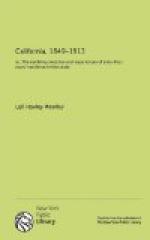Uncle Phil Roach, the editor, was in later years a member of the State Legislature and tried to get an appropriation to cover his loss but his efforts were of no avail.
President Lincoln and Gen. Vallejo.
President Lincoln in the early part of the Civil War called General Vallejo to Washington on business. While there General Vallejo suggested to Mr. Lincoln that the United States build a railroad into Mexico, believing as he said, it would be a benefit to both nations. Mr. Lincoln smilingly asked, “What good would it do for our people to go down to Mexico even if the railroads were built? They would all die of fever and according to your belief go down yonder,” with a motion of his hand towards the supposed location of the infernal regions. “I wouldn’t be very sorry about that,” remarked General Vallejo coolly. “How so?” said Mr. Lincoln. “I thought you liked the Yankees.” “So I do,” was the answer. “The Yankees are a wonderful people, wonderful. Wherever they go they make improvements. If they were to emigrate in large numbers to hell itself, they would somehow manage to change the climate.”
Off to the Nevada Mines.
Uncle Billy Rodgers, from Peoria, Ill., was a fellow passenger of mine when crossing the plains in 1849 in the first division of the “Turner, Allen & Co. Pioneer Mule Train,” consisting of 40 wagons, 150 mules and 150 passengers. He was a gambler before he left home and he gambled all the way across the plains. Many people think that a gambler has no heart but this man was all heart. I knew him on one occasion, after visiting a sick man in camp, to take off his shirt and give it to the sick man and go about camp for an hour to find one for himself.
We arrived in California on September 10, 1849. We parted about that time and I saw no more of him until the winter of ’68 and ’69 when I was on my way to White Pine in Nevada. We had to lay over a few days at Elko, Nevada, in order to get passage in the stage. As we had saddles and bridles we made an effort to get some horses and furnish our own transportation, and we had partly made arrangements with a man by the name of Murphy. The day previous to this I overheard a conversation between two gentlemen sitting at the opposite end of a red hot stove. After they parted I approached the one left and said, “Is this Uncle Billy?” He said, “Yes, everybody calls me ‘Uncle Billy’ but I do not know you.” I gave him my name and he was as glad to see me as I was to see him. We had a long and very pleasant chat.
Now to take up the line of march where I left off, I said, “Hold on boys a little while I go and see a friend of mine.” “All right,” said they. I called on Uncle Billy and told him what we were doing and asked him what kind of a man Murphy was, and his answer was, “He’s a very good blacksmith,” and repeated it two or three times, then said, “I am in a wild country and never say anything against anybody.”




